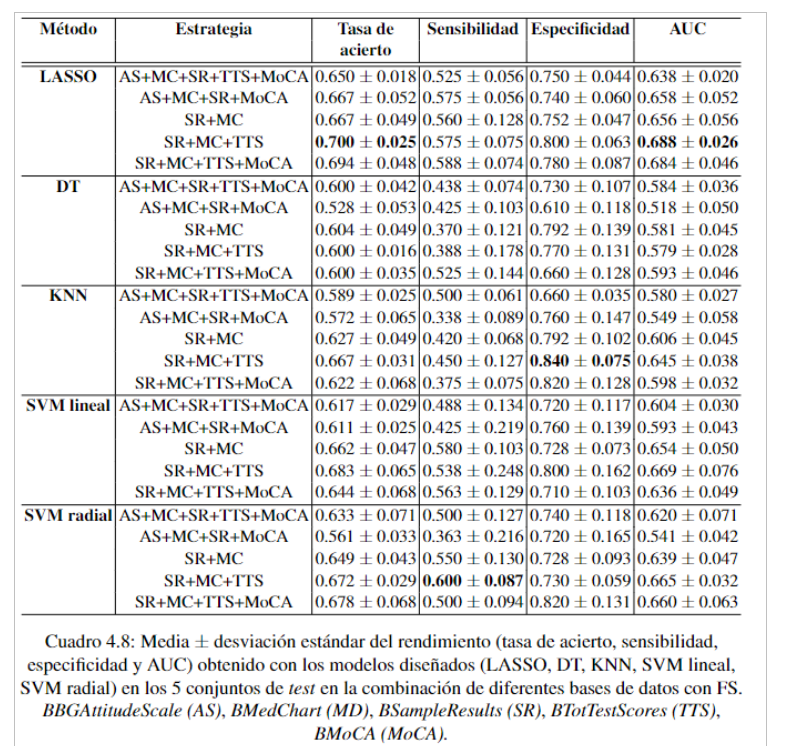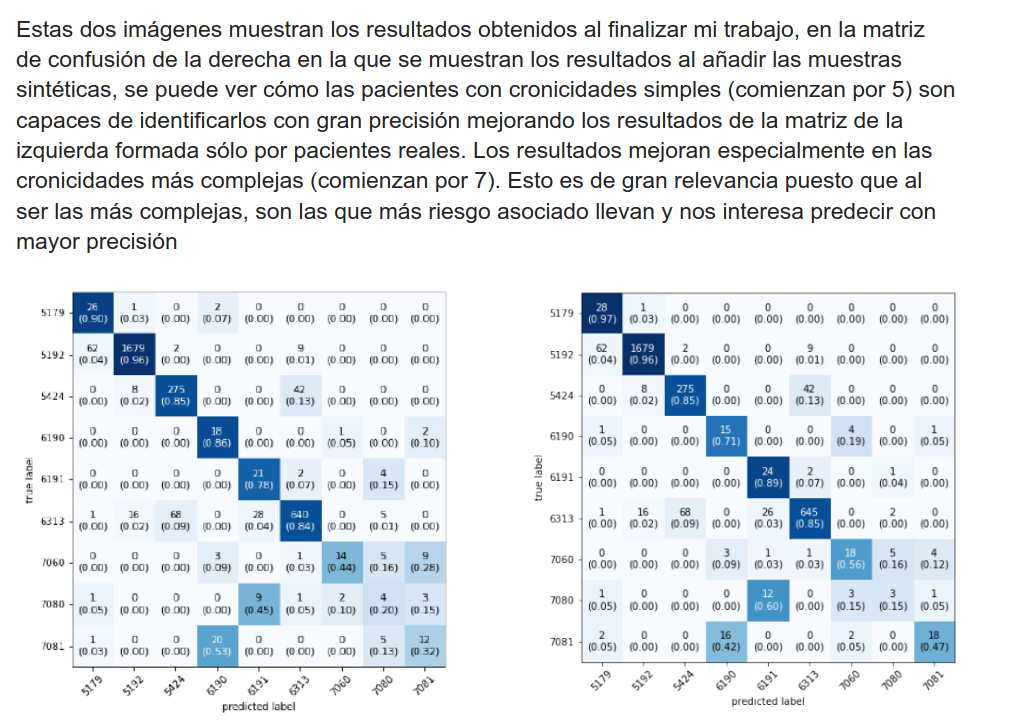Below we interview Vanesa and Maite:
Vanesa Gómez Martínez's Final Degree Project is entitled Machine Learning Methods to Identify Factors Associated with the Appearance of Severe Hypoglycemia in Patients with Type I Diabetes
Can you summarize your final degree project for us?
Diabetes is a chronic disease whose prevalence has been constantly increasing in recent decades, becoming one of the leading causes of death worldwide. In 2021, 537 million adults were diagnosed with diabetes, and the number of diabetics is estimated to increase to 643 million and 783 million by 2030 and 2045, respectively. Specifically, around 10% of these patients have type 1 diabetes mellitus (T1DM). Several studies have shown that mortality in the T1DM population is due to different factors, including severe hypoglycemia (HS) being the cause of death in 4-10% of T1DM patients.
The objective of the Final Degree Project (TFG) was twofold. First, we sought to analyze risk factors associated with the appearance of HS in adult patients with T1DM using feature selection methods. Feature Selection (FS)). Second, we sought to evaluate the effectiveness of supervised ML methods to classify diabetic patients with HS. For this, patient data extracted from the public databases of the Jaeb Center for Health Research in Florida. Specifically, six databases are used that analyze: (i) patient attitudes towards glucose levels; (ii) medical chart, (iii) medications consumed; (iv) cognitive evaluation; (v) results of blood tests; and (vi) cognitive tests. In this TFG an exhaustive exploratory data analysis was carried out, and pre-processing of the same in order to be used in different ML methods. Logistic regression, decision trees, k-nearest neighbors, and support vector machines were used to predict whether or not a patient with TDM would suffer an HS event.

Vanesa, why did you apply for these awards?
The decision to apply for this call was largely due to the contribution and impact that my project could have towards one of the objectives that this 2030 Agenda promotes, and that is health and well-being. This work is in line with this need, since it has enabled the prediction of severe hypoglycemia events in patients with T1DM based on the design of measurement methods. machine learning, and consequently, the identification of risk factors that trigger this type of event. With this, studies related to the search for a treatment and cure for this disease could be accelerated. In addition, if we take into account that T1DM has a prevalence that exceeds 9 million worldwide and that severe hypoglycemia is the cause of death between 4-10% in this population, it is therefore evident that it is not a problem. minor. For this reason, the importance of having identified risk factors for hypoglycemia is highlighted, as well as the possibility of mitigating them thanks to their automatic identification, being able to prevent an emergency and, in many cases, save lives. This actively contributes to a greater promotion of the health of the people who suffer from it, something essential for sustainable development.
What are you currently doing Vanessa?
Currently, I am studying the Master's Degree in Artificial Vision at the URJC and working in the Natural Language Processing and Information Retrieval research group at UNED. As of today, I only need to present the Final Master's Project, which I am about to finish. These studies together with the degree in Biomedical Engineering have allowed me to acquire a high level of knowledge in the field of Artificial Intelligence, being able to observe even more the importance of using this type of technique to achieve a common good and, above all, to be helpful in automating tasks. complex. Specifically, my work is focused on the clinical field, making it a field of support for health personnel, as well as an improvement in care and quality of life for the patient.
In the not so distant future, I am going to enroll in the PhD Program in Information and Communication Technologies at the URJC. For all this I must partly thank my TFG and TFM tutors, Cristina Soguero Ruiz and Cristian David Chushig Muzo, and with whom I will do my doctoral thesis in the future. This would not have been possible without you. Thank you for the opportunity you have given me and for the team we have formed together.
Any recommendations for future students?
I can only say, based on my experience, that if this whole process were to start again, I would be studying Biomedical Engineering again. It is a degree that gives you both knowledge and personal growth. I have always been passionate about the fields of medicine and engineering, and without a doubt this degree allows you to combine both branches by applying the principles and methods of engineering to the understanding and resolution of problems in the medical field. It has carved out a future for me, and fundamentally, a future that I am passionate about and I like.
Maite Jurado Camino's Final Degree Project is entitled Antagonistic Generative Networks for the Classification of Chronic Patients
Maite, can you give us a summary of your work?
Chronic diseases represent 92,8% of the causes of death in
Spain, which leads us to consider whether tools based on
Machine Learning (ML) to help medical staff in decision making and
thus reducing the impact that these diseases have on our society. One of
The main challenges when trying to apply these techniques in the clinical setting is the
shortage of samples. no information yourficient, our models cannot
learn correctly. Therefore, our objective with this work was to address
this scarcity of samples by generating synthetic samples based on
on data from real chronic patients. This would allow us to increase the size of
examples available for our ML model and assess whether the generation of
synthetic samples improves the results in the classification taskfication.

Why did you apply to this call for awards?
The Sustainable Development Goals (SDGs) are important because they address
holistically interconnected global challenges. I applied for these awards
because giving them visibility helps to raise awareness and mobilize actions to
achieve a sustainable and equitable future for all. This job offers the opportunity
to promote a new perspective in a field as fundamental as medicine,
opening doors to a future of scientific advancesficos and technological allowing
innovations in healthcare by applying AI and ML techniques
for more informed decision making, in this case predicting the
Chronic Diseases reducing their impact, one of the objectives of the Agenda
2030, in which the Heads of State and Government pledged to develop a
strategy based on the prevention and treatment of these, seeking to reduce the
premature deaths due to Chronic Disease in 33%.
Tell us what you are doing now please.
I am currently studying a Master's Degree in Artificial Intelligence since it is a field that
passionate and from which I would love to continue training and learning.
At the same time I work as a research assistant at the Rey Juan University
Carlos, my line of research is focused on the application of techniques based on
Machine Learning for monitoring chronic patients and Covid.
In the future I would like to continue developing this line of research and focus on the
application of ML techniques to the clinical field.
Finally, what would you recommend to future students?
Biomedical Engineering is characterized by its interdisciplinary approach that allows
combine the principles of engineering and medicine. This race promotes
collaboration of experts in various areas from which you can enrich yourself and contribute
Innovative solutions that improve people's quality of life. It's a
field in constant evolution and very broad ranging from bioinformatics,
biomechanics to data analysis so you will have a wide range of
possibilities to find the specialization that you are most passionate about.

